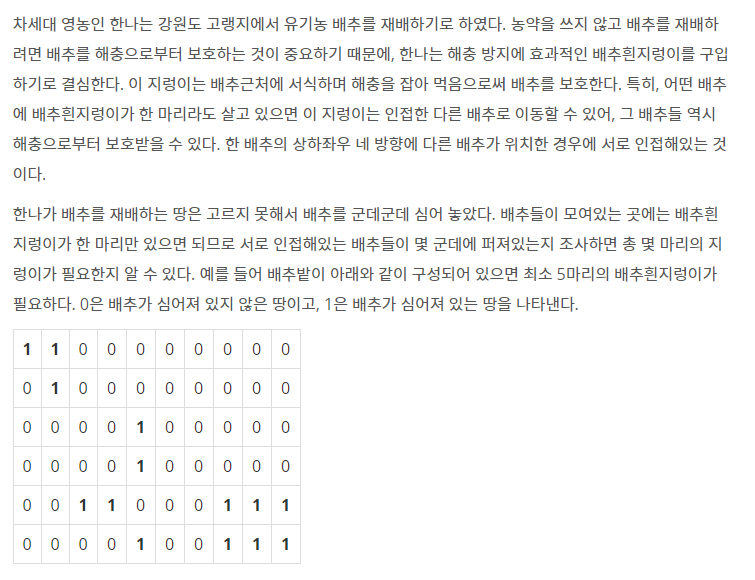반응형
이전 게시글에서 BFS와 DFS에 대해 다뤘었다.
이번에는 그 응용.
첫번째는 1012번이다.

말이 어렵지 그냥 1 연속된 칸의 갯수를 구하는 문제다.
(x,y)의 값만 잘 설정한 뒤에는 dfs든 bfs든 상관없이 풀이해도 된다.
t=int(input())
for _ in range(t):
stack=[]
li=[]
cnt=0
x1=[1,-1,0,0]
x2=[0,0,1,-1]
m,n,k=map(int, input().split())
space=[[0]*n for x in range(m)]
check=[[0]*n for x in range(m)]
for _ in range(k):
a,b=map(int, input().split())
space[a][b]=1
li.append([a,b])
for x in range(m):
for y in range(n):
if space[x][y]==1 and check[x][y]==0:
cnt+=1
check[x][y]=1
stack.append([x,y])
while stack:
a,b=stack.pop()
check[a][b]=1
for i in range(4):
A=a+x1[i]
B=b+x2[i]
if (0<=A<m) and (0<=B<n):
if space[A][B]==1 and check[A][B]==0:
stack.append([A,B])
print(cnt)다음은 2178번
정석적인 길찾기 문제이다.

def miro(space,vis):
q=[(0,0)]
vis[0][0]=1
while q:
x,y=q.pop(0)
if x==n-1 and y==m-1:
return vis[x][y]
dx=[0,0,1,-1]
dy=[1,-1,0,0]
for i in range(4):
ax=x+dx[i]
ay=y+dy[i]
if 0<=ax<n and 0<=ay<m and vis[ax][ay]==0 and space[ax][ay]==1:
q.append((ax,ay))
vis[ax][ay]=vis[x][y]+1
n,m=map(int,input().split())
space=[]
vis=[[0]*m for x in range(n)]
vis2=[[0]*m for x in range(n)]
res=[]
res2=[]
for x in range(n):
inp=list(str(input()))
inp=list(map(int,inp))
space.append(inp)
print(miro(space,vis))다음은 1389번, 몇명을 거쳐서 사람을 만날 수 있는가를 케빈베이컨 수라고 하는데 이 수가 가장 작은 사람을 구하는 문제다. A라는 사람부터 N명의 사람까지의 케빈 베이컨 수를 모두 더한 뒤에 리스트에 넣고, 비교하는 식으로 코드를 작성했다.

def bfs(v,vis):
q1=[v]
q2=[]
c=[0 for x in range(102)]
cnt=1
vis.append(v)
while q1:
q2=[]
while q1:
v=q1.pop(0)
for x in range(102):
if li[x][v]==1 and x not in vis:
vis.append(x)
q2.append(x)
c[x]=cnt
q1=q2[:]
cnt+=1
return c
n,m=map(int,input().split())
num=[]
res=[]
li=[[0]*(102) for x in range(102)]
LIST=[]
for x in range(m):
a,b=map(int,input().split())
li[a][b]=1
li[b][a]=1
LIST.append(a)
LIST.append(b)
LIST=list(set(LIST))
LIST.sort()
for x in LIST:
vis=[]
num.append(sum(bfs(x,vis)))
MIN=99999
for x in range(len(num)):
if MIN>num[x]:
MIN=num[x]
res=x
print(LIST[res])마지막 1697번. 처음 봤을때, bfs인 것을 떠올리기가 쉽지 않아서 실버 1인 것 같다.

from collections import deque
def bfs(arr, n, k):
q = deque()
q.append(n)
while q:
i=q.popleft()
if i==k:
return arr[i]
for j in (i+1, i-1, 2*i):
if (0 <= j < 100001) and arr[j] == 0:
arr[j] = arr[i] + 1
q.append(j)
n,k= map(int, input().split())
li = [0] * 100001
print(bfs(li, n, k))
반응형
